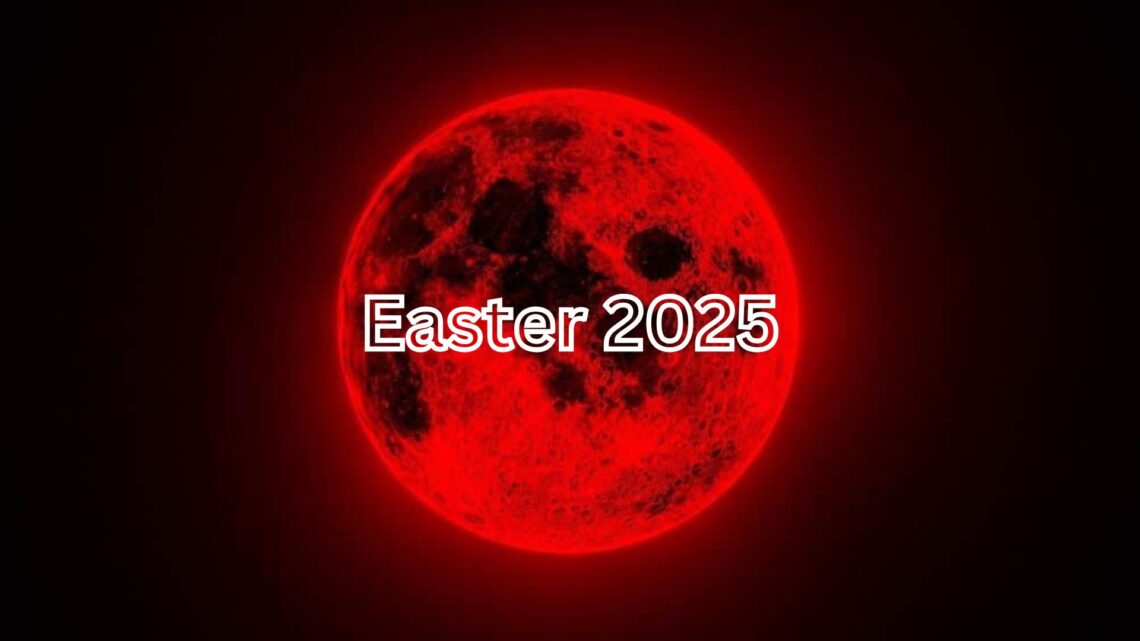Easter Sunday in 2025 will fall on April 20, making it one of the latest dates in recent history. Typically, Easter occurs between March 22 and April 25, but in 2025, a rare Blood Moon lunar eclipse will influence the timing of this religious holiday. Understanding the connection between celestial events and Easter’s date provides insight into the interplay of astronomy and Christian traditions.
Why Easter Falls on April 20, 2025
Easter does not have a static date like Christmas. Instead, it follows a formula based on the first full moon after the spring equinox. The timing of Easter depends on several key factors:
- Spring Equinox: This marks the start of spring in the Northern Hemisphere, occurring on March 21, 2025.
- Paschal Full Moon: The first full moon after the equinox, also known as the Paschal Moon, determines Easter’s date.
- Blood Moon Lunar Eclipse: A total lunar eclipse on March 13-14, 2025 will delay the Paschal Moon, pushing Easter to a later date.
Key Dates for Easter 2025 Calculation:
| Event | Date |
| Total Lunar Eclipse | March 13-14, 2025 |
| Spring Equinox | March 21, 2025 |
| Paschal Full Moon | April 13, 2025 |
| Easter Sunday | April 20, 2025 |
The Role of the Blood Moon in Easter’s Date
The March Blood Moon eclipse is significant because it occurs just before the equinox. Since the equinox determines Easter based on the first full moon, this event shifts the Paschal Moon to mid-April, delaying Easter. This alignment pushes Easter Sunday to April 20, instead of an earlier date in March or early April.
How Lunar Cycles Influence Easter
Lunar calendars determine many religious festivals, including Ramadan, Passover, and the Chinese Lunar New Year.
Christianity also incorporates celestial mechanics into its calendar, particularly when setting Easter’s date. The moon’s orbit and the occurrence of eclipses can result in variations in Easter’s timing each year.
How Easter is Determined Each Year?
Unlike Christmas, which falls on December 25, Easter follows a more complex system that depends on the moon’s cycles. The Church of Alexandria established the current calculation method in 325 AD, known as the Computus. The rules include:
- Easter arises on the first Sunday after the Paschal Full Moon.
- The Paschal Full Moon is the first full moon occurring on or after March 21.
- If the full moon falls on a Sunday, the church observes Easter the following Sunday.
Historical Context: Late Easters in the Past
Easter 2025 is among the latest observed dates for the holiday. However, the latest possible Easter occurred on April 25, which has happened only a few times in history. Some of the latest Easters include:
| Year | Easter Date |
| 1943 | April 25 |
| 2038 | April 25 |
| 2025 | April 20 |
Celebrating Easter in 2025
Since Easter is falling late in 2025, many traditions may be influenced by the timing:
- Warmer Weather: A late April Easter means warmer temperatures for outdoor celebrations, egg hunts, and parades.
- Spring Festivals: Many communities will incorporate Easter with other spring festivals and cultural events.
- Church Services: Christian denominations worldwide will observe Easter Sunday with traditional church services, sunrise masses, and community gatherings.
Easter Traditions Worldwide
Easter is rejoiced in several traditions across different cultures:
- United States & Europe: Easter egg hunts, festive meals, and church services.
- Greece: Midnight church services and the tradition of red Easter eggs.
- Latin America: Religious processions and community feasts.
- Philippines: Passion plays and reenactments of the crucifixion.
Conclusion
Easter 2025 will be observed on April 20, influenced by the rare Blood Moon eclipse and lunar cycles. This unique celestial alignment underscores how astronomy and religious traditions intersect. Whether celebrated with family gatherings, church services, or cultural traditions, Easter remains a deeply significant event for millions worldwide.
By understanding the astronomical reasons behind Easter’s timing, we can appreciate the fascinating connection between faith, tradition, and the cosmos. Let us know how you plan to celebrate Easter 2025!








Leave a Comment